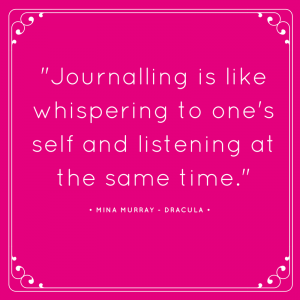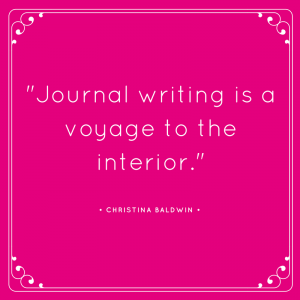I’m no writer…
…but here’s why I journal
There have been a whole bunch of studies done on the power of writing out your thoughts. Try googling it.
But let me tell you about why I do it to see if that speaks to you. I dream like a mad-woman. I’m as busy in my dreams as I am in my day. And I remember pretty much every day what I’ve dreamt the night before. I can wake up in tears, shaking with fear, laughing or in shock. But I always dream. And because of the way dreams work it often triggers stuff that I need to work through. I write it down. And if I’ve had an argument with Andrew or I’m worried about the children or I’m exploring something for my business. I write them down too.
Journaling clears my head and structures my thoughts. Once it’s out on paper it all feels better or more manageable somehow.
5 reasons why you should give journalling a red-hot go:
1. Journalling taps into the creative part of your brain
The art of writing – even a few poorly structured sentences – every day is a deeply creative endeavour. Often you’ll think nothing very exciting has happened worthy of documenting but somehow you’ll end up on a tangent to the original thought and suddenly you’re brainstorming a problem or dreaming up a new development for your work or family.
Journalling encourages problem-solving as opposed to problem-storing, and in our world where we’re constantly bombarded with information, and demands on our time and resources this is especially important.
2. Journalling has mental health benefits
Feelings of overwhelm are almost an everyday event for many juggling the complex demands of home and family life. It is one of the most common issues raised by my coaching clients in my practice rooms.
Journalling helps you get the stuff out of your head. Once the thoughts and feelings are out on paper it somehow satisfies your mind. The trick is to write down both thoughts AND feelings.
There have been many scientific studies in recent years backing up the benefits of journalling, including this one. For anyone processing trauma or stressful life events, just 15-20 minutes of journalling 3-5 times can make a significant difference to recovery. Similar statistics have been shown for those suffering chronic and life-threatening illness.
I am also very supportive of self-care. The more we can do to look after ourselves, the better. Journalling is the cheapest kind of therapy going – all you need is a piece of paper and pen and you’re good to go! There are no complicated processes to follow, you can chose when and where to do it…and more importantly there is no judgement attached. Your thoughts, your feelings and just for you to see.
3. Journalling can help you achieve stuff
Through journalling you write about the things that matter to you – the things you feel strongly about. In so doing you are connecting to the deeper stuff of your soul and by regularly connecting to them, you are more likely to live out a purposeful life, closely aligned to your values and beliefs. (See this blog for more on this)
And this important because the more closely we live a life aligned to our core values, the happier and more fulfilled we are.
Journalling in this manner also helps keep you on track. If you’re a goal-setter, or like me an intention-setter, these are things that you will be writing about, reflecting on. It’s not about being accountable to your journal, more that you are likely to connecting with your intentions every time you journal and therefore more likely to manifest them. Ultimately journalling helps you achieve your dreams.
4. Journalling can help you track stuff
Having a written-down record of things – achievements, disappointments, curve-balls, dead-ends and even u-turns are all useful for growth and development. It’s also incredible to have that record to refer to, to be able to go back and see how you got to where you are now – whether to remind yourself so you can replicate successful behaviour or as a tool to enable you to consider an alternative approach for future endeavours.
Imagine having years worth of journals to be able to turn to. Imagine all that personal history just sitting there waiting to be learned from, perhaps bettered.
5. Journalling helps you know yourself better
It’s all about personal growth really. Whatever you write about it will be an exploration of self. A journal is simply a reflection – a personal reflection – of your life’s events. Regardless of how you phrase it, how verbose you are, how full and flowery your choice of vocabulary, your journal is detailed story of your life. Whatever, and however you write about it is impossible not to grow and know yourself better as result.
That’s just gold.
My journal methodology
I’m not going to tell you how to journal because I think it’s a pretty personal business, but I will tell you that my journal is a beautiful lined notebook from Europe, with lovely high-quality paper so I don’t smudge. I also have a particular pen that I always use. Remember I love to ritualise things!
Every day I write the date and time (gives me a guide when I flick back as to what is working or needs tweaking), the day of my menstrual cycle (so that I am always aware) and I list at least three things I’m a grateful for. For me it’s vital that I start my day feeling full of gratitude for all the blessings I have in my life – even on my darkest days I can always find at least three things that I utterly thankful for.
Then I have a little mental process I follow, even though now it just flows:
-
how do I feel?
-
what do I need?
-
thoughts that need clearing
-
connect to my dream
And then I write. And write and write until I’ve got all I need out of my head and onto the paper. Sometimes it’s a few lines and sometimes several pages. But when it’s done I feel at peace in a way that I can’t really explain properly. Aligned to my truest self maybe.





